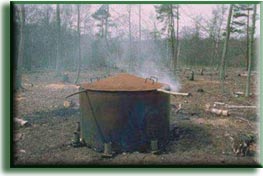A recent study by the Global Carbon Project has shown a sharp rise in carbon emissions globally since the year 2000. The study said carbon emission was rising by less than one percent annually up to 2000, but was now rising at 2.5 percent per year, mostly as a result of rise in charcoal consumption and a lack of new energy efficiency gains.Could it be that increased restrictions on new technology and on the construction of new power plants have increased carbon emissions? Could it be that our old friend the Law of Unintended Consequences is once again in effect here? I suspect so.
Hear me out. New power plants have the increased efficiencies sought, but as increased environmental regulation makes construction of these newer power plants more difficult and more expensive and there fewer new plants are built (just consider for example NZ's RMA restrictions on new power plants), then older, 'dirtier' plants that new technology would make obsolete are left to produce for longer -- and carbon emissions are increased rather than reduced.
 And the burning of charcoal (right) is a uniquely third world means of producing low-quality energy that is on the increase as other, more efficient means of energy production are made more difficult and more expensive, especially in parts of Asia and Africa where the increased charcoal burning has reportedly been happening.
And the burning of charcoal (right) is a uniquely third world means of producing low-quality energy that is on the increase as other, more efficient means of energy production are made more difficult and more expensive, especially in parts of Asia and Africa where the increased charcoal burning has reportedly been happening.So my hypothesis here is that increased environmental regulation has led to accelerated carbon emissions. Counter-intuitive that may be, but that's the Law of Unintended Consequences for you (the one law that all enthusiasts for regulation should at least try and get to grips with).
The thing to realise is that human economies and human production are not a static entity that can be easily commanded and controlled -- economies are dynamic: try and stamp down on enterprise in one area and it will pop out in another, more unexpected area. Stop new technologies, and older technologies will take up the slack -- and there is no older, more historic form of energy production than the burning of charcoal, and none dirtier either.
So my conclusion? If decreasing or slowing down carbon emissions is really important to you, then I suggest you support the deregulation of energy production and the increased production of new energy -- especially in the third world.
LINK: Carbon emissions have risen sharply since 2000 - Daily India
Unintended consequences - Concise Encyclopaedia of Economics
RELATED: Energy, Politics-World, Global Warming
2 comments:
I think that the "Law of Unintended Consequences" does apply to the unbundling of Telecom networks as well. The main aim of unbundling Telecom networks is to:
#1) Lower the price by so called fair competition.
#2) Increase the communication transmission speed in line with the demand of high volume/speed of today's business.
Now , the "Law of Unintended Consequences" from unbundling Telecom, will get us stuck with copper for the next (who knows) perhaps 40 years. Telecom would want to hold on to copper as long as possible, simply because, to install high speed non-copper network cost too much. Information transmissions thru copper wires have physical limitations where it cannot be pushed any further.
FF, I think (in principle) that you're exactly right.
Post a Comment